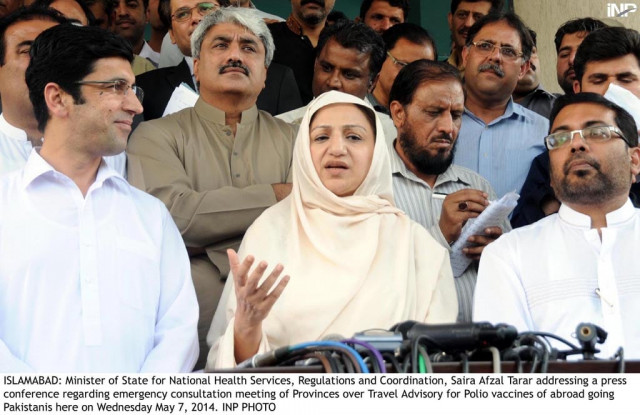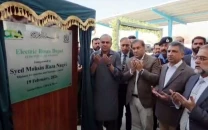Polio eradication programme: Tarar to respond to monitoring body’s ‘harsh’ remarks
Health minister says international board is unaware of Pakistan’s ground realities

The federal health ministry is planning to write a letter to the head of the Independent Monitoring Board (IMB) in order to register its protest over the ‘harsh’ language used in its report on Pakistan’s polio eradication programme.
Talking to The Express Tribune, Minister of State for National Health Services, Regulation and Coordination (NHSRC) Saira Afzal Tarar said “Pakistan has serious reservations over the kind of language used in the IMB report. It is demoralising and gives an impression to the world that Pakistan is not serious about eradicating the crippling disease.”
People working for polio eradication in Pakistan know how to wipe out the disease and do not need dictation from others who are unaware of ground realties, she said.
“There is a need to understand that Pakistan is serious about eradicating polio and knows what is doable to achieve the set target,” insisted the minister.
Regarding the recommendations given by the IMB in its report, which was released on Saturday, Tarar said is was not possible to hand over the entire programme to the National Disaster Management Authority. “It (NDMA) lacks the capacity and understanding about the sensitivity of the disease and measures required for its eradication,” she added.
Meanwhile, an important steering committee meeting is going to be held today where all stakeholders, international partners and provincial health secretaries will review the IMB suggestions.
“It will be decided in the meeting which suggestions should be accepted and implemented, however, it is evident that Pakistan cannot accept all of the IMB suggestions,” revealed Tarar.
Women’s Parliamentary Caucus meeting
Following the report’s release, Tarar called a Women’s Parliamentary Caucus meeting on Tuesday at the Parliament House to review polio programmes and take suggestions on improvements.
According to a press release, MNA Shaista Pervaiz emphasised on the role women legislators can play in mobilising communities for social change. She urged the minister to increase incentives of frontline workers.
Discussing the steps taken and planning for the upcoming low-transmission season, Ayesha Raza Farooq, the PM’s focal person for the Polio Monitoring Cell, said they are using community mobilisers in high-risk union councils and local leaders, as well as the army, to ensure maximum immunisation coverage.
She stressed the government was adopting special and flexible approaches in priority areas including one-day security cordoned campaign, collective (hujra) vaccination, self-vaccination, engaging healthcare providers, maximising EPI centres, permanent vaccination teams.
“In light of prime minister’s directive we are also working on the revised communication plan with a new branding that converges routine immunisation and polio,” she revealed while terming it as one of the key recommendations of the IMB.
Talking to The Express Tribune, an official working for the programme, said parliamentarians in the meeting expressed concern over the poor hygiene and sanitation issues in the country.
She said in many places sewerage water carrying the poliovirus is mixing with drinking water. “This contaminated water is being consumed by many children, which is in turn infecting them,” she said.
The caucus also suggested that basic information about vaccine-preventable diseases be included in school curriculums as it will help create awareness.
Published in The Express Tribune, October 29th, 2014.



















COMMENTS
Comments are moderated and generally will be posted if they are on-topic and not abusive.
For more information, please see our Comments FAQ